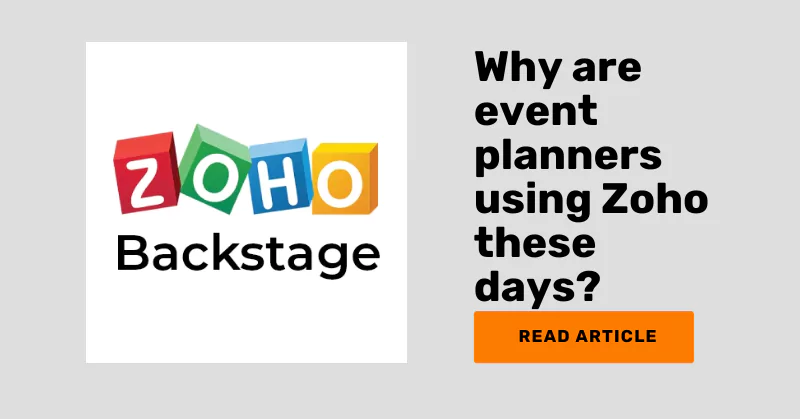It’s hard to survive in the event industry without knowing all the event planning terminology and jargon.
This comprehensive list of terms will cover all the event planning terms you may come across.
Use it like your pocket dictionary every time you find yourself stranded in this vast field.
There are often times you hear something and have absolutely no idea what it means. Unfortunately, you can’t afford in this in this field as miscommunication can lead to severe losses.
Without further ado, let’s dig in.
A. Event planning terminology

You’ll often hear these terms from those who are directly involved in the event planning process. Keep these event planning terms in mind, especially if you’re new in the industry.
- Attrition: This refers to the number of registered attendees who don’t show up for the event. This can have a significant financial impact on the event planner or the venue
- Back of House (BOH): Areas that are typically not seen by guests (kitchen, storage)
- Blackout Dates: The dates on which a venue can’t host events (holidays, repairs)
- Bump-In: It refers to the setting up of equipment and décor before the event
- Bump-Out: Similarly, it means dismantling and removing the event set up after the event
- Call Time: It is the time given to staff and performers to arrive. It’s hours before the audience or attendees arrive but can vary for the performer
- Capacity: The maximum number of people a venue can hold. For example, the capacity of this hall is 500 people
- Catering Minimum: It refers to the minimum amount you must spend on food and beverages. Most reputed caterers and hotels have a catering minimum to limit the bookings they get
- Day Delegate Rate (DDR): Price per attendee per day for a venue, including meeting space, refreshments, and lunch
- Deadlines: Dates by which tasks or payments must be completed
- Double-Booked: Having two events booked for the same space/time. Double booking can also apply to any vendor who has booked the same slot for two clients. This problem arises due to poor calendar management
- Dry Run: It is a practice run of the event before the actual event. This helps identify potential problems during the event and troubleshoot them
- Floor Plan: It refers to the layout of the event space including the seating area, stalls, and other areas
- Full Buyout: It refers to renting the entire venue for exclusive use
- Overlay: This refers to temporary flooring or structures built on top of existing venue features. It’s often done on dance and event floor rentals
- Post-Event Report: Analysis of the event’s success in terms of profit, attendee satisfaction, and return on investment
- Registration Fee: Cost to attend the event that the attendees have to pay
- Run of Show (ROS): Detailed schedule of the event from the entry of guests to clean up after all the guests have left
- Seating Chart: It refers to the arrangement of seating for the event. Events with fixed seating and VIP guests often have this
- Signage: Signs used for wayfinding and information at the event. This is to ensure smooth guidance of attendees from one area to another. It also eliminates the need for a human to guide attendees
- Strike: The action of dismantling and removing the event set up after the event is over
- Subcontracting: Hiring another company to handle specific event services such as water supply
- Waitlist: It refers to a list of people who want to attend the event but haven’t secured a ticket yet
B. Event planning terminology used for marketing
- Content Marketing: Creating interactive content to attract attendees. Examples include blog posts and social media posts
- Guerilla Marketing: This refers to unconventional marketing tactics to promote the event. For example, using an ad in a food delivery app to promote an event
- Hashtag: Words or phrases preceded by # to categorize social media content
- Lead: Potential customer identified through event marketing
- Lead Retrieval: Capturing attendee contact information through online forms. One way to do this is through Ticket Generator which has an API feature
- Sponsor: Refers to companies that financially support the event in exchange for promotion.
- Call to Action (CTA): A clear, concise statement that tells viewers what you want them to do next. For example, “Register Now!” or “Download the Event App”
- Public Relations (PR): Generating positive media coverage for your event through press releases and news articles
- Targeted Marketing: Direct your marketing efforts towards a specific audience that is most interested in your event. For this, you’ll first have to identify your target audience for the event
C. Event planning terminology used for guest interaction

- Breakout Session: Smaller, focused sessions during a larger event, especially online. You can have breakout rooms and sessions in a Zoom/Google call to facilitate teamwork. This is required when there are multiple teams working simultaneously during an online event
- Buzz Session: It’s an informal gathering for attendees to network. It mostly happens after the main event has attendees
- Engagement: It refers to how attendees interact with the event and each other. For example, socialization or clicking lots of photos indicates engaged attendees
- Hybrid Event: Events that combine in-person and virtual elements. For example, attendees gather at the event venue in real life but a speaker may join virtually
- Meet & Greet: Informal session for attendees to meet speakers or sponsors after the event. Attendees often wait for this session to click pictures with the celebrities or speakers
- Name Badge: This badge is given to attendees and it contains information such as their name/designation. The content can be customized according to the nature of the event.
- On-Site Registration: It refers to the attendees who register for the event on-site without any pre-booking. Having walk-in or spot registrations or not is a decision the event planner is free to take
- Post-Event Survey: This is a feedback survey that is sent to attendees after the event. It is to get qualitative insights about the event
D. Venue-related event planning terminology
- Stage Design: It is the visual layout and elements that create the stage environment for presentations and entertainment
- Air Walls: These are freestanding modular walls for temporary spaces. It’s mostly needed when you’re setting up the event in a completely empty space
- Bleachers: These are temporary tiered seating for events. For example, they can be used in seating for large audiences
- Corner Booth: This is an exhibitor booth that is located at the intersection of two aisles
- Green Room: It is the waiting area backstage for speakers, performers, or VIPs. It’s often concealed so that the attendees don’t disrupt the artists before the event
- Stage Manager: The stage manager oversees the technical aspects of presentations. This is done before the event starts and also double-checked before the actual performance
- Winge: This is an off-stage area on either side of the stage. It is often used for storing equipment or props
E. Technology terms used in event management

- Walkie-Talkie: It’s a two-way radio used for communication. This is often used by backstage crew members, stage managers, and security personnel
- A/V: Audio Visual (equipment) that can include microphones, speakers, projectors, screens, and more
- Backline: It is the equipment used by musicians onstage. For example, drums and amplifiers
- Gamification: It refers to using game mechanics such as points or badges. It is really helpful in increasing attendee engagement
- Digital Signage: Electronic displays used to showcase event information and branding. These are often used as reusable event decor as they’re very versatile
- Hybrid Event Platform: A software platform specifically designed to manage and deliver hybrid events. These combine in-person and virtual components of events
- Interactive Kiosk: A self-service computer terminal providing information, registration, or help to attendees
- Livestreaming Platform: It is a service that allows broadcasting an event live over the internet. For example, YouTube is a popular live-streaming platform
- RFID (Radio-Frequency Identification): It is a technology that uses radio waves to track objects or people. In events, RFID wristbands can be used for cashless payments, access control, and data collection
- Virtual Reality (VR): VR is an immersive, computer-generated environment that users can experience. VR can be used for presentations, product demos, or interactive experiences at events
- Virtual Tour: It is a computer-generated simulation of a location. This allows attendees to explore a venue or destination virtually
- Webcast: It’s a live or pre-recorded broadcast of an event streamed over the internet
F. Entertainment-related event planning terminology
Events are all about entertainment, so you’d be hearing a lot of these event planner terms.
- Breakout Entertainment: It refers to the entertainment options offered during break times. It can mean simple activities such as live music, performances, or interactive games
- Keynote Speaker: It refers to the main speaker at an event. They often summarize key takeaways and leave a lasting impression
- Headliner: This is the main performer or attraction at an event. They’re often the face of all the event posters
- Interactive Entertainment: Concerts and speeches may be part of your entertainment. However, they don’t necessarily require attendee participation. These activities encourage participation. Examples include photo booths, games, and audience response systems
- Technical Rider: This is a document that outlines the technical specifications required by a performer. It’s often submitted days or weeks in advance so that performances go smoothly
G. Legal and financial event planning terminology
- Cancellation Clause: This clause in the contract outlines the terms for canceling the event and any fees if applicable
- Certificate of Insurance (COI): This document proves if the event planner has liability insurance to cover potential accidents or injuries
- Chargeback: This term is used when a credit card payment is reversed due to a dispute
- Contract Negotiation: It refers to the process of discussing and agreeing on the terms of a service agreement. Some situations where contract negotiation is required include venue contract and vendor contract
- Copyright: Legal protection for original creative works. Event organizers need to be aware of copyright restrictions when using music, images, or other materials. Here are few event licenses you need to know about to avoid copyright claims
- Exhibitor Services Manual: It is a document outlining guidelines and procedures for exhibitors
- Force Majeure: This clause specifies what happens in case of unforeseen circumstances during events.
- Gross Revenue: This is the total income generated by the event, before deducting expenses. Do not confuse this with profit or net revenue
- Hold Harmless Clause: In this clause, one party agrees not to sue the other for any damages or liabilities arising from the event. The enforceability of these clauses can vary by jurisdiction
- Indemnification: It’s a legal agreement where one party agrees to compensate another party for any losses
- Intellectual Property (IP): Intangible creations such as logos, trademarks, or patents. Event organizers need to protect their own IP and be mindful of infringing on others’
- Liquor Liability Insurance: It’s an insurance required in some locations to serve alcohol at an event
- Minimum Guarantee: This is the guaranteed amount of revenue received by the venue. It is regardless of the actual number of attendees
- Net Profit: It is the total revenue from the event minus all associated expenses
- Payment Schedule: This is an outline of when and how payments will be made to vendors and other service providers. It’s best to have one in place to track all expenses and due dates
- Payment Terms: This refers to the conditions for payment, such as due dates and acceptable payment methods
- Sponsor Fulfillment: A term used when the event planner delivers all promised benefits to sponsors in exchange
- Sponsorship Agreement: A formal contract outlining the terms of a sponsorship, including the sponsor’s contribution and the benefits they receive
- Tax Implications: Events may be subject to various taxes, depending on location and activity. Understanding these is crucial for proper financial planning
- Vendor Contract: It’s a legal agreement between the event organizer and a vendor outlining the services to be provided, costs, and other terms

F. Acronyms used as event planning terminology
- API: Application Programming Interface (used for integrations between software). For example, using Ticket Generator API in your landing page for tickets
- ADA: Americans with Disabilities Act (used to meet accessibility standards in events)
- BEO: Banquet Event Order (document outlining event details)
- CMP: Certified Meeting Professional (industry certification)
- CRM: Customer Relationship Management (software for attendee data)
- CTR: Click-through rate (used for measuring the success of online event marketing)
- DDR: Day Delegate Rate (venue price per attendee per day)
- ETA: Estimated Time of Arrival (for vendors or deliveries)
- F&B: Food and Beverage
- HVAC: Heating, Ventilation, and Air Conditioning (venue systems)
- LED: Light-Emitting Diode (used in lighting design)
- MC: Master of Ceremonies (person who runs the event)
- NGO: Non-governmental organization (event beneficiary)
- PAX: People (used for guest count)
- RFP: Request for Proposal (document sent to venues to get bids)
- ROI: Return on Investment (how successful the event was)
- RSVP: Respondez s’il vous plait (French for “Please respond”)
- SKU: Stock Keeping Unit (used for inventory management)
- SLA: Service Level Agreement (between vendor and organizer)
- SWAG: Stuff We All Get (event giveaways or free gifts)
- TIA: Thanks In Advance
- VIP: Very Important Person
- VOD: Video On Demand (recordings of event sessions sent upon request)
G. Summarizing event planning terminology
Wow, wasn’t that a long list of event-planning terminology and acronyms. However, we would like to point out that using such terms requires a level of expertise too. Their meanings can change depending on the content.
For example, in a large conference, a breakout session might be a smaller, focused discussion on a broader topic. In a smaller event, it could be a more interactive workshop.
Similarly, in the case of registration, there are so many different types! Registration can be online, on-site, or a combination. The process will vary depending on the event size and complexity.
Remember, the key is not just memorizing terms, but understanding their context too.
Stay up to date with the industry, and event planning terminology won’t seem so hard.
You can sign up for our newsletter below so you don’t miss a single update in the event industry.
H. FAQ
1. What is greenwashing in events?
It is a form of misleading marketing that portrays an event as more environmentally friendly than it is.
2. Who is the closing keynote speaker?
It’s the last speaker in the event and is often the most important in the panel of speakers.
They summarize the whole event at the end of their speech.







One Response
This article is an invaluable resource for anyone in the event planning industry! The extensive list of terminology and jargon is not only comprehensive but also crucial for effective communication. Understanding these terms can significantly enhance event execution and ensure smooth operations. Great job on making this information accessible!